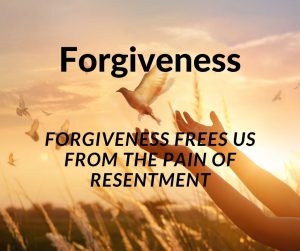
Forgiveness

Description
Forgiveness means overlooking mistakes and letting go of resentments. Forgiveness frees us from the needless pain of reliving a hurt repeatedly. Forgiveness doesn’t mean making a wrong choice right; it brings the generosity of spirit to release it. Forgiveness can heal even the most grievous offense. It brings a blessed opportunity for a clean start. Accepting Divine forgiveness transforms our hopeless guilt into resolve. Self-forgiveness moves us forward, ready to do things differently, with compassion for ourselves and faith that we can change. Forgiveness opens the door to hope.
Quote
“Resolve to be tender with the young, compassionate with the aged, sympathetic with the striving, and tolerant with the weak and wrong. Sometime in your life, you will have been all of these.”
— Robert H. Goddard
The Practice of Forgiveness
- I overlook mistakes.
- I free myself from pain and resentment.
- I am willing to heal the past.
- I find it in my heart to give others another chance.
- I use guilt only as a signal for change.
- I accept Divine redemption.
- I have the power to change for the better.
Definitions and practices of virtue are used with permission from the Virtues Project™.
In Family Life
Forgiveness within a family is a beacon of love and resilience. It manifests as a willingness to let go of past grievances and embrace healing and understanding. In a family, forgiveness is demonstrated through heartfelt conversations where hurt feelings are acknowledged and discussed openly, allowing each member to express their perspective. It means choosing empathy over anger and second chances over grudges.
Forgiveness involves showing compassion and offering support when a family member makes a mistake rather than resorting to blame. It is the art of moving forward together, stronger and more united, fostering an environment where trust and unconditional love flourish, ultimately nurturing the bonds that hold the family together.
Balancing Forgiveness
Forgiveness shines as a beacon of hope and renewal, capable of transcending pain and fostering reconciliation. However, like any virtue, it must be balanced with other virtues.
-
-
- Wisdom: By tempering forgiveness with wisdom, individuals can discern when it is appropriate to extend forgiveness and when to establish healthy boundaries, ensuring that forgiveness does not become a tool for perpetuating harm.
- Compassion: Cultivating compassion alongside forgiveness fosters empathy for oneself and others, enabling individuals to navigate forgiveness with kindness and understanding while acknowledging the complexity of human nature.
- Justice: Upholding the virtue of justice alongside forgiveness ensures that accountability is not forsaken. It involves holding individuals responsible for their actions while allowing reconciliation and healing space.
- Courage: Courage bolsters forgiveness by empowering individuals to confront past hurts, face the discomfort of vulnerability, and take necessary steps toward forgiveness and healing, even in the face of adversity.
-
May we embrace forgiveness as a profound strength that propels us toward healing and wholeness.
